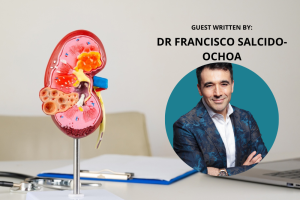Doctor On Call, or DOC for short, is a brand new series brought to you by Medical Channel Asia. This series aims to bring doctors and specialists from various fields to give you an introduction to common health and medical topics that you and the Asian population are interested in. In our 4th DOC, held on 5 Oct (Tuesday), from 8pm to 9pm (GMT+8), we have Dr Michael Ross MacDonald, consultant cardiologist from Harley Street Heart and Vascular Centre, to talk to us about The Silent Killer: High blood pressure and heart disease.
This 3-part cardiology webinar series aims to educate the Asian population on the different aspects of cardiac conditions, ranging from the risk factors of heart diseases, to the most current updates on CPR, and the types of treatment options available after a heart attack.
For Part 1 of the forum, we have Dr MacDonald give us a short presentation on blood pressure and why they are called the silent killer. In Part 2, Dr MacDonald answers some of the questions posted LIVE by our audience. Read below to find out what more about the silent killer: high blood pressure, and its association with heart diseases!
Presentation by Dr Michael MacDonald
Why high blood pressure is called the silent killer?
Heart is a muscular pump, beating about 100,000 times per day. About 5-6L of blood are pumped through the aorta and blood vessels every minute. Every time the heart pumps, a pressure is created and pushes the blood against the blood vessels’ walls, which is also known as the blood pressure.
- The higher number is the systolic blood pressure – when the heart is beating
- The lower number os the diastolic blood pressure – when the heart is relaxing
Blood pressure readings
- Optimal: <120 / <80
- Normal: 120-29 / 80-84
- High normal: 130-139 / 85-89
- Grade 1 hypertension: 140-159 / 90-99
- Grade 2 hypertension: 160-179 / 100-109
- Grade 3 hypertension: >179 / >109
It does not matter whether the systolic or diastolic is high: when either one is high, you are considered to have hypertension. The higher the readings, the higher the risk of heart diseases and stroke.
Statistics
High blood pressure is a very common condition. 1 in 3 people in Singapore have high blood pressure, with the incidence increasing with age. 1.64 billion patients globally have hypertension, and almost half of them do no know that they have high blood pressure.
Symptoms
High blood pressure generally causes no symptoms. It just sits around in the background, damaging the arteries (due to the high pressure to the arteries’ walls). Hence, hypertension is often called the silent killer, which can only be detected upon regular screening and checking.
Why is high blood pressure a problem?
High blood pressure causes damage to the arteries, and this damage can occur at arteries that supply any part of the body and any organ. This can cause damage to the organs, which can include the brain, heart, kidneys etc.
Damage to the walls will lead to inflammation and deposition of fatty plaques in the arteries. If the plaque ruptures, it can cause stroke, heart attack etc. It may also lead to kidney failure, blindness, erectile dysfunction and dementia.
It is also not usually a short term or acute problem. It is usually a chronic problem over the years, 5, 10, 15, 20 years. Hence, it is important to have blood pressure under control.
What causes high blood pressure?
1. Primary hypertension
- 90% of people
- No specific cause
- Driven by genetics and lifestyle
- Lack of exercise – sedentary lifestyle
- Overweight
- High salt intake – often hidden in a lot of food
- Stress
- Nutrition – high in processed food intake
- Smoking
- Excessive alcohol
- Older age
- Sleep apnea – quite common in Singapore
1 in 3 Singaporeans suffer from sleep apnea, and mostly (90%) are undiagnosed. 1 in 10 have severe sleep apnea. 60-80% of sleep apnea patients are hypertensive, and an estimated 30-40% of hypertensive patients also have sleep apnea. Sleep apnea occurs when your throat muscles intermittently relax and block your airway during sleep.
Signs and symptoms: poor concentration and memory, morning headaches, mood changes, choking sensation at night, gasping at night, loud snoring.
2. Secondary hypertension
- <10% of people (rarer)
- Has specific cause(s) –> hence, can be cured
How is high blood pressure diagnosed?
- Home BP monitoring: Average BP >135/85
- Doctors’ office: Average BP >140/90
- 24-hour BP monitoring: Average 24-hour BP 130/80 (one of the most accurate ways to diagnose hypertension)
Everyone should have a home blood pressure monitor, measured at the upper arm. Checking BP at home should only be when you are relaxed and not when you are stressed. You may consider taking it in the morning or evening. It should also be average of multiple readings and not just 1 reading.
Know your risk of heart disease
Blood pressure is one fo the risk factors that lead to heart disease and stroke. Heart disease and stroke risk factors can be lumped together as they are part of the same process: development of plaques in the arteries
Modifiable risk factors include:
- Smoking
- Lack of exercise
- High blood pressure
- Blood glucose
- Cholesterol
- Nutrition
- Alcohol
- Psychosocial factors
- Metabolic syndrome
Non-modifiable risk factors include:
- Gender
- Family history
- Kidney disease
- Inflammation
- HIV
- Previous radiation therapy
- Age
- Ethnicity
Important numbers to know and target
- Blood pressure: most people should be <120/80 mmHg. The higher the BP, the higher the risk.
- Sugars
- Glucose level: Normal <5.5mmol/L | Prediabetes 5.5-6.9mmol/L | Diabetes > 7mmol/L
- HbA1c: Normal <5.7% | Prediabetes 5.7-6.4% | Diabetes >6.5%
- Circulating sugars will affect and damage the blood vessels
- Cholesterol: mainly looking at LDL cholesterol (i.e. ‘bad’ cholesterol)
- The lower the better, ideally less than 3 mmol/L
- BMI and waist
- Ideally strive to normal BMI and waist circumference.
- Increased weight leads to increased risks of heart diseases
Lifestyle changes to lower your blood pressure and risk of heart disease
Weight
Weight is closely related to blood pressure. When you are overweight, losing 1kg will lead to an average of 2/1 mmHg drop in blood pressure. Most often the first thing to do to lower blood pressure is to lose weight.
Nutrition
2 types of diets that are considered to be heart-healthy and are backed by clinical trials and scientific evidence: Mediterranean Diet, DASH Diet.
- Mediterranean Diet: Fruits and vegetables, fish, nuts
- DASH Diet: designed to lower blood pressure. Within 8 weeks, blood pressure can be lowered by 5-6 mmHg
In summary: more vegetables, fish; less red meat, processed food, salt, alcohol, sugar.
Exercise
More powerful than ANY drug in preventing cardiovascular diseases. Reduces death by 20-30%. Just doing 10 minutes a day can lower death rate. Other benefits include lowering of blood pressure, LDL cholesterol and body weight.
Generally, I advice 5 x 30min sessions of brisk-walking (150min per week), plus muscle strengthening exercises 2 days a week. However even you are unable to, most importantly is to get off and start moving.
Sleep and rest
Sleeping < 7 hours a night can lead to:
- Increased blood pressure
- Increased risk of heart attack and stroke
- Eating more calories
- May burn proteins instead of fats
Many reasons to prioritise sleep to improve cardiovascular health. Some key things to improve your sleep include:
- Have a routine – go to bed and wake up at the same time everyday
- Medications and Cognitive behavioural therapy (CBT) – helps with insomnia
- Exercise but not too late in the day (3 hours before bed) – increase body temperature will make it more difficult to sleep
- Avoid caffeine after lunch – takes 8 hours to wear off
- Avoid alcohol – fractures sleep and affects quality of sleep
- Less large meals at night
- Dark, cool bedroom
- Exposure to natural light during the day
Mental Health
People who suffer from depression and anxiety can increase risk of cardiovascular diseases. Stressful events increases risk of heart attack by 1.34x, and stroke by 1.75x. Some points to improve mental wellness
- Talk to your doctor if you have symptoms of concerns
- Connect
- Relax
- Adequate sleep
- Exercise
Summary
High blood pressure is really common and is symptomless – hence called the ‘silent killer’. It leads to many heart diseases and early death. But this can be easily checked by yourself, and I advice everyone to have a blood pressure monitor at home. Some key lifestyle modifications include losing weight, eating a diet with non-processed food, get active, sleep well and prioritising mental wellness.
What’s next in store?
- See Part 2 for the Question and Answer (Q&A) segment with Dr Michael MacDonald!
- See the full video on both our Medical Channel Asia’s Facebook page and our Medical Channel Asia’s YouTube channel:
- If you have missed our previous DOC webinars, visit our Medical Channel Asia’s YouTube page, or you can also read the articles:










